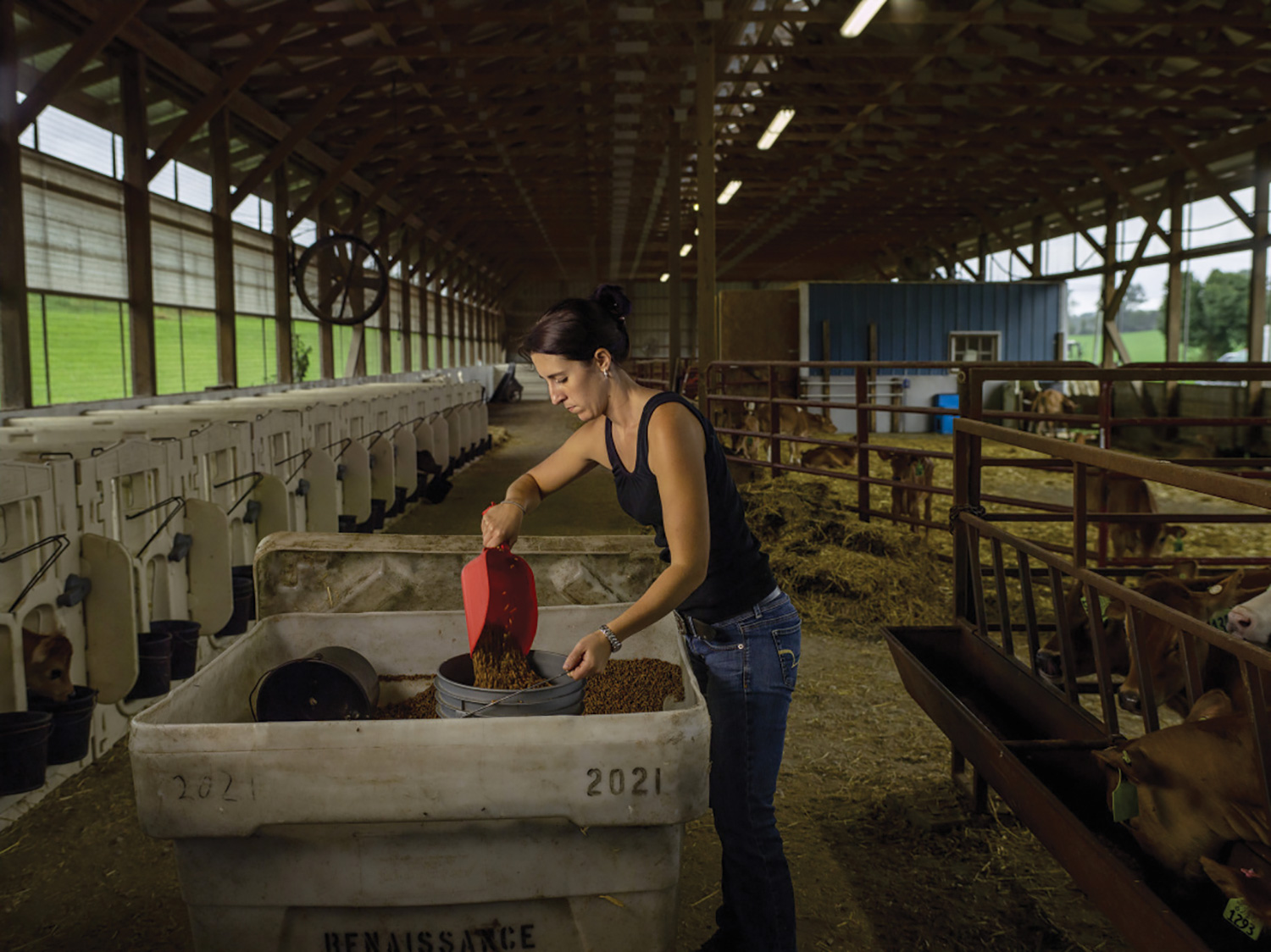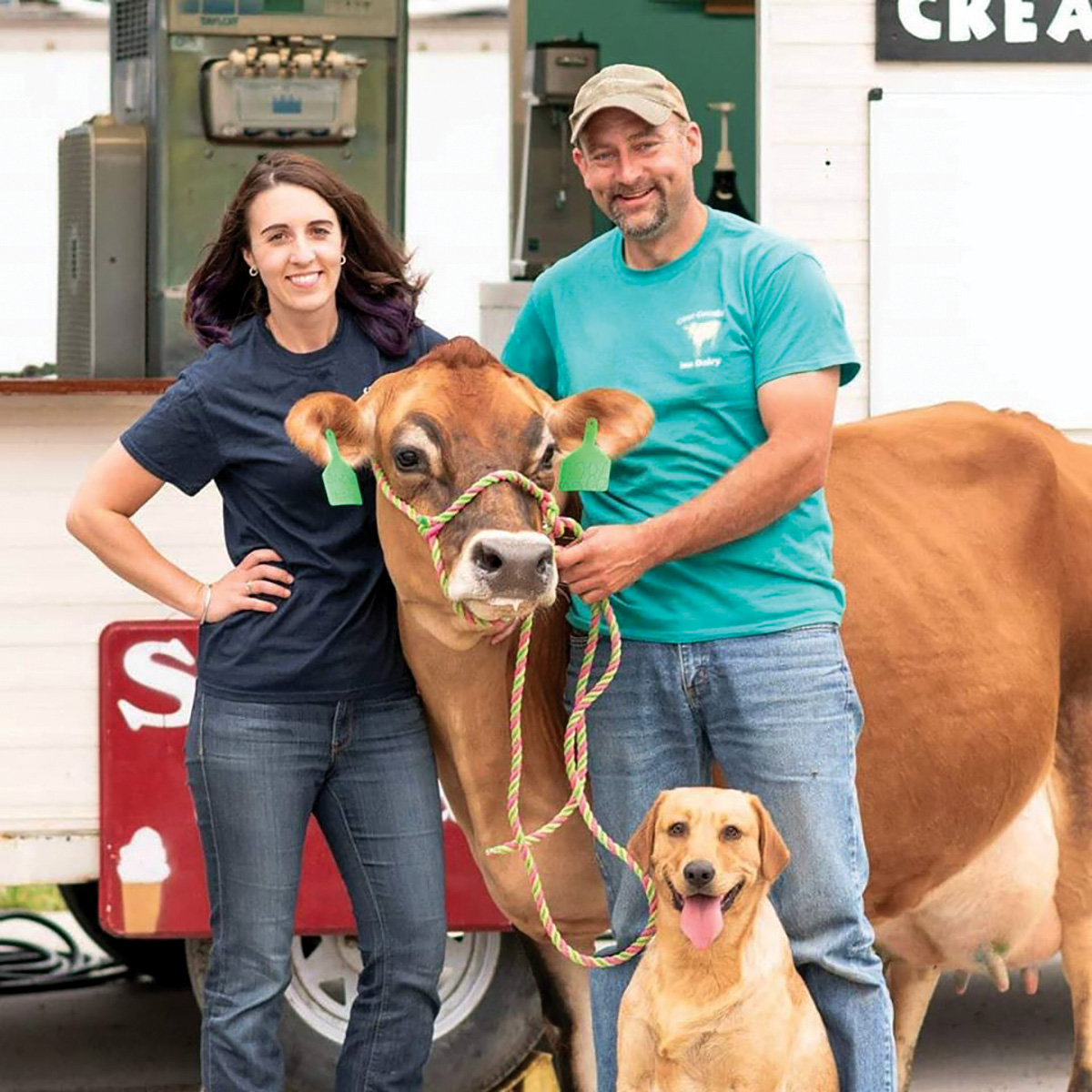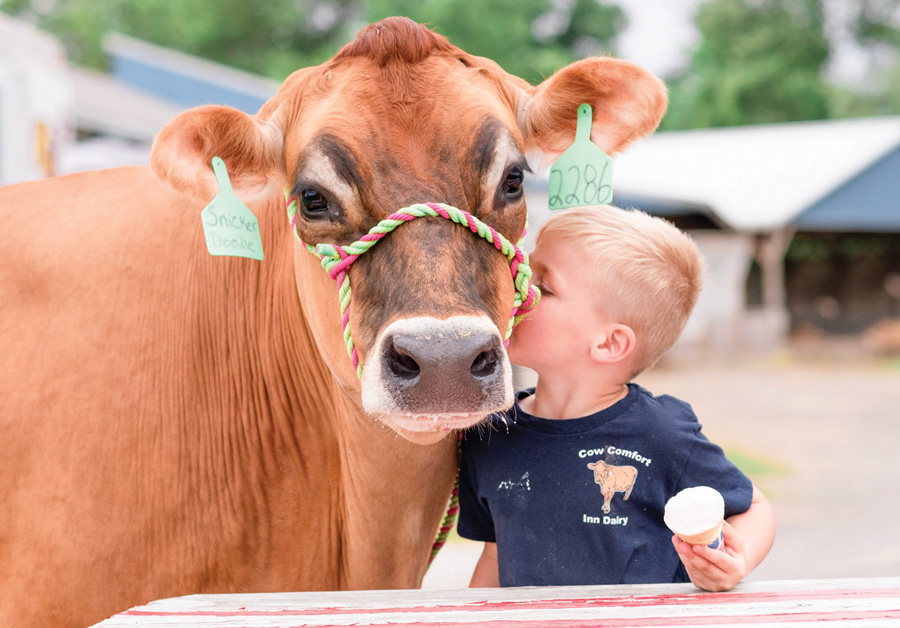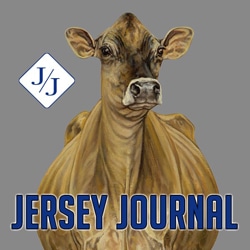Dairy Advocacy Needs Everyone

When animal agriculture is besieged with negative headlines, one might become cynical and assume all consumers have a PETA mindset. But the vast majority are not hellbent on destroying the industry. They are simply far removed from agriculture and becoming more so every day. When farmers bridge the distance between them and consumers with communication and education, headlines lose their ability to influence. Farmers begin to see consumers as people who are curious to learn more and seek to connect with those who produce their food. The very same tools that spread bad news are opportunity for dairy producers to spread good news.
A Jersey breeder who is rallying for dairy and agriculture every chance she gets is Katie Dotterer-Pyle. She and her husband, David, operate Cow Comfort Inn Dairy in Union Bridge, Md. The 400-cow dairy is mostly Jerseys or Jersey crosses. The Pyles offer tours of the farm and recently established Cow Comfort Creamery to sell soft serve ice cream through a mobile trailer unit on the farm and at special events.
David is the farm’s cow whisperer, content to operate behind the scenes and make the comfort aspect of the dairy reality. And though Katie does her fair share of farm chores, she is fast becoming known for her ability to talk agriculture to consumers.
She has appeared on Good Morning America, done an interview for Oprah’s SuperSoul Conversations podcast and rubbed elbows with the likes of NFL Hall of Famer Jerome Bettis and Ree Drummond, a.k.a. the Pioneer Woman, to promote awareness of production agriculture.
Katie encourages everyone to consider themselves as an advocate.
“Whether your audience is five or 5,000, you are an advocate when you speak about your business,” Katie noted. “There is room for every one of us in this effort no matter the size of your audience.”
“Let people know you are a dairy farmer. Make a point of being known as the ‘farmer’ in your circle of influence and be willing to answer questions.”
“With just 2% of the population holding jobs in production agriculture, we no longer have a choice on whether to advocate or not. We are in this together and need to stand united to ensure the future of animal agriculture is a bright one.”
Katie’s Advocacy
Like most effective advocates, Katie did not set out to become an influencer. She became one through process, by pursuing a passion armed with an innate ability to connect with others.
Her audience didn’t start out in the thousands, but rather, one-on-one.

The notion of championing agriculture first crossed her mind when she was farming with David and went back to school to earn her undergraduate degree in secondary Spanish education from Bloomsburg University.
“I found myself talking to classmates about the farm and cows often,” Katie noted. “They had simple, basic questions about agriculture and no one to ask. Often their questions centered around issues in the headlines.”
“I spent a lot of time and energy—still do—getting to the ah-ha moment, that place where I can just see the light bulb go off in their head and hear them say, ‘Oh yeah that makes total sense.”
Back on the farm, Katie used the experience to develop a concept that could help visitors learn about the industry during tours. The theme—Cow Comfort Inn Dairy: Where Cows Enjoy Their Stay—is an analogy with which consumers can relate and one Katie can use broadly across the farm.
In the analogy, cows “check in” to the inn and pay their way when they calve at two-years-of-age and then “change careers,” moving from milk production to beef production. They receive a myriad of amenities, including a free continental breakfast, daily childcare, pre-natal check-ups and health and nutrition plans from certified professionals. Complimentary pedicures, comfortable mats and local transportation are available at Cow Comfort Inn as well.
“The hotel theme has given us opportunity to provide some really good talking points,” Katie continued. “I find consumers to be very receptive to farming practices, even negatively perceived ones, when they understand why they are done.”
“When I explain how expensive it is to feed and house an animal, consumers understand why dairy producers cull unproductive animals and can respect their business decision to do so. When I talk about the special attention a calf gets after birth (colostrum, navel dipping, heating lamp, dissipation of disease spread, etc.), they understand why dairy farmers separate cows and calves.”
Virtual Visits and Social Media
Farm tours through videos are another means Katie and David have used to reach consumers. A lot of ground can be covered in a short period of time with this highly effective medium.
In a video developed for the Maryland Farm and Harvest series from Maryland Public Television in April 2018, Katie and David talk about pedometers. Using an analogy for Fitbit, the two explain how they are used to monitor cow movement for health and production management. David also takes opportunity to illustrate use of another technology on the farm—ultrasound—to show viewers a month-old calf in the womb during a pregnancy check.

The video is extremely effective at showing how technology can help producers better manage their dairies and why dairying today looks different than it did for our peers in the 1950s.
Two videos produced by the American Dairy Association (ADA) North East in November 2018 and March 2019 were designed as virtual classrooms for middle and high school students. Combined, they have been viewed more than 4,300 times to date.
The pre-scripted format of video allows talking points to be integrated in a meaningful and seamless manner. For example, Katie used a milk house visit to address concerns about antibiotics in milk, stressing that it is illegal for producers to ship milk with antibiotics and that milk is tested for antibiotics at 17 different points in the milk chain. She explained how medicated cows are managed and showed how milk flows on the farm from cow to bulk tank to hauler, never being touched by human hands. The milk house visit was just one of several opportunities Katie used to connect with consumers.
More recently, ADA North East and Katie collaborated on “Farm Fun with Farmer Katie” to educate and entertain consumers during the COVID-19 pandemic. For four consecutive days beginning on March 23, 2020, viewers were treated to pre-recorded videos on calf care, cow care, cow nutrition and cow milking. The fifth day was a live segment from Katie’s kitchen demonstrating how to bake cream cheese snickerdoodles. Each event was paired with post video activities, including coloring pages and recipes.
Though the series was aimed at young children, it reached many parents too, who asked as many questions as their kids about agriculture.
Many believe advocacy needs to begin with social media and blogs. Quite the contrary, Katie is a self-proclaimed late comer to Facebook and Instagram. She now utilizes both tools, though, using Facebook primarily to reach baby boomers, millennials and generation-X and Instagram for younger audiences.
Katie has developed a product line around her flagship hashtag, #AskFarmersNotGoogle, selling shirts and other products through an online shop. Though temporarily closed due to the coronavirus pandemic, it will re-open when conditions permit.
Katie writes a blog on the farm website as well. With titles like “The Next Generation Doesn’t Have to Share Our Name” and “When We Have to Sell a Cow,” she candidly talks about how she feels when employees leave to start their own businesses and the tough necessity of culling a cow, among others.
Off the farm, Katie makes 2-3 speaking engagements each month. She teamed with Bettis to promote agriculture in the inaugural Land O’Lakes Farm Bowl in Minneapolis, Minn., in February 2018. The duo competed against five other teams of farmers paired with NFL players in a timed event that included pulling tires off a tractor, fixing milk pipes, loading hay bales and directing a drone through a corn field.
For the Good Morning America appearance in June 2019, she shared the stage in New York City with Laila Ali (Mohammad Ali’s daughter) to kick off the cross-country, multivehicle Real Love tour to teach kids the importance of nutrition and the value of dairy products.
She has worked with some of the country’s top chefs to promote dairy through a Land O’Lakes food blogger tour and talked to Dan Pashman in an episode of The Sporkful, an award-winning foodie podcast.
Katie has been interviewed by Katelyn Duban for an episode of The Rural Woman Podcast and was a feature story for the online Thought Catalog. Recently, she wrote an article for Progressive Dairyman on the topic of being a “real farmer.”
She has also teamed with other dairy advocates, including Jessica Peters of Spruce Row Dairy, Meadville, Pa., to educate and entertain audiences. Among this duo’s efforts was a dairy dance off in which the two filmed themselves dancing to Taylor Swift’s “Shake It Off.” Across the campaign, the dance off had millions of views and an untold number of comments and shares.
Katie’s Why
Katie’s why—the dairy cows—have been with her from the beginning. This third-generation dairy farmer was raised in central Pennsylvania on a dairy that still milks about 1,000 Holstein cows. She earned an associate’s degree from South Hills School of Business and Technology and set out to follow her dreams—first, work a year somewhere else, a rule laid down by her dad in order to return to the home dairy, and then make the return.
“I always joke, if you want to hear God laugh, tell him your plans,” Katie remarked.
It was while working at another farm that she met David, a fellow third-generation dairy farmer, whose family sold their herd of Registered Jerseys in Vermont in 2006.
The two married in 2009. They started dairying with 90 Holsteins on a rented farm in the Shenandoah Valley of Virginia and began to transition the herd to Jerseys. The Pyles then moved to Lewisburg, Pa. They moved to and purchased the present farm in north central Maryland in 2013 and set up shop here with close to an all-brown herd of cows. Today, the herd is 97% Jersey or Jersey-cross.
Cows are housed in freestalls and a bedded pack barn (pre-fresh, fresh and hospital cows) and milked in a double-12 herringbone parlor. Calves are raised in individual pens in a calf barn, then transitioned to group pens with automatic feeders. Cows have access to pasture in warmer months, depending on stage of lactation.

Katie gives time to her other passion—Spanish—as well. She teaches Spanish part-time in the Frederick County Public School system and established KDP AgEducation to teach dairy-specific Spanish to dairy farmers and industry professionals, as 80% of the agricultural workforce is Spanish-speakers. She works with the Dairy Girl Network to enroll men and women alike in the Spanish on la Granja (on the farm) courses. The eight-week, 16-lesson virtual classes are available in the fall, winter and spring.
Down the road, Katie hopes to provide English as a second language (ESL) classes to native Spanish speakers to further close the communications gap. KDP AgEducation is also her platform to promote her availability as a public speaker and advocate.
What Can I Do?
Everyone’s advocacy looks different. Audiences are different. Time commitments are different. And skill sets are different. Your plan will be as unique as you.
“You don’t have to do social media,” Katie explained. “You don’t have to make videos or do farm tours. Just put forth the effort to connect with consumers and be willing to answer questions.”
“If you’re looking for help, visit with your local dairy check off program or Dairy Management Inc. Both have been tremendous assets to me. They have knowledge and tools to help you, no matter where you are in the advocacy journey.”
When asked what surprised her most about her experience as an advocate, Katie replied, “I was amazed at how critical my own people can be. I expected it from some consumers, but not from fellow dairy farmers.”
“It takes courage to put yourself out there, so, for heaven’s sake, don’t be critical of your fellow farmers. If you don’t agree with a farming practice we do and want to state so, please create your own page and share your own story.”
What can you do if larger-scale advocacy isn’t in your thing?
“Like posts. Share posts. Support influencers. Call them,” Katie noted. “Last week, a farmer called me out of the blue and said, ‘I just wanted to let you know I appreciate everything you are doing for our industry.’ It made me cry.’”
Above all, be kind to others., Katie summed. We are in this boat together. Let’s be a united front and work together to negate negative headlines and build a trusting relationship between farmer and consumer.
Editor’s Note: Katie is available to answer questions you may have about advocating. She can be reached by email at ccidairy@yahoo.com or message on the dairy’s Facebook page at Comfort Cow Inn Dairy.




